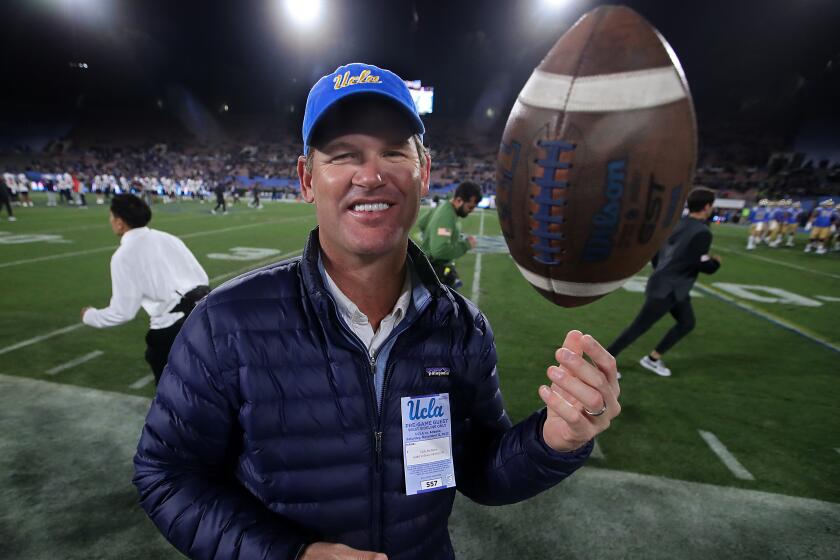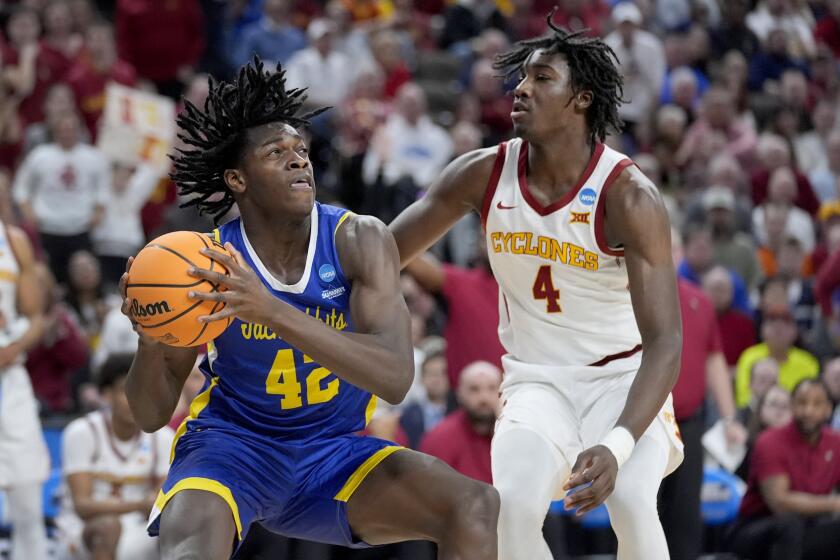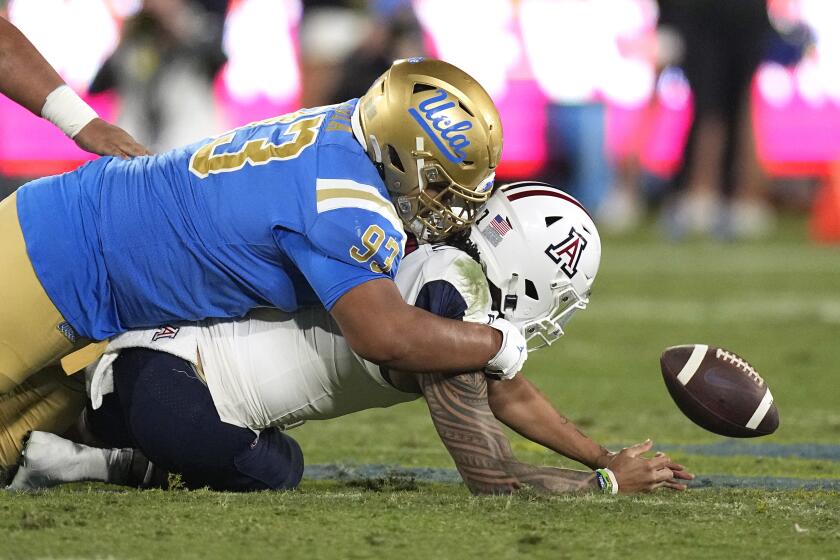End of this old boy’s net work
Photographs cover almost every inch of wall space in Al Scates’ office, a gallery of faces forever young. Books, plaques and keepsakes from his travels cover his desk and crowd the ledge beneath a window framing the view he has enjoyed for 50 years.
“This is pretty filled up,” he said.
The trees outside his window couldn’t have been more than hopeful striplings when Scates began coaching men’s volleyball at UCLA in 1962. The parking lot he used to see across Bruin Walk has been replaced by the John Wooden Center.
The campus has changed, but Scates has been a constant through five decades, the first 42 years on mutually agreed-upon one-year contracts. Scates will coach his final home opener Friday in his final season before he retires.
He has won 19 NCAA titles, a standard matched by only a few Division I coaches in any sport, and two U.S. Volleyball Assn. titles before men’s volleyball became an NCAA championship sport. His ability to mold 44 U.S. national team members and 27 Olympians and launch dozens of coaching careers underscores his ability to inspire and communicate his love for the sport.
“The era of Al Scates coaching UCLA is a special era in collegiate athletics that, maybe because it’s men’s volleyball, most people don’t appreciate,” said UC Irvine Coach John Speraw, who played for and coached alongside Scates and will be an assistant coach of the U.S. men’s Olympic team in London.
“He has been a coach, a mentor, a good friend. It’s hard to sum it up because he means so much to me and, I think, lots of alumni.”
Three-time Olympic gold medalist Karch Kiraly is among those admiring alumni.
“It seems surreal that he coached for 50 years and it seems surreal that he’s going to retire,” said Kiraly, who played on three of Scates’ NCAA championship teams and will be an assistant coach for the U.S. women’s team in London.
“He got us so used to just the fact that he was going to coach, and coach and coach, that it is a shock to the system now. To coach 50 years is something I cannot wrap my head around -- and the 19 titles that he and UCLA have won.”
Scates, 72, hasn’t lost his touch or his enthusiasm. His Bruins are 5-1 and ranked third by the American Volleyball Coaches Assn., and he’s awake at 5:30 a.m. and in the gym for 7:30 a.m. practices.
But the demands of coaching seem only to increase, and after supplementing his coaching salary with teaching jobs for 35 years, until 1997, he’s ready for an easier pace. He’s also ready to let his wife of nearly 51 years, Sue, choose travel destinations that don’t involve volleyball tournaments and to see more of their four grandchildren, ages 4 to 14.
Scates played baseball and basketball in high school and tried football at Santa Monica College, thinking he would become a football coach. His team won the Junior Rose Bowl in 1958 under Coach Jim Powers, who had a novel idea to keep athletes in shape after the season.
“He told the football players, ‘I’m going to coach a volleyball team, and we’re going to enter a junior college tournament, so I want all you guys to try out,’” Scates said. “I didn’t know how to play and he cut me in about five minutes, which was justified. But I did sit around and watch the guys he chose.”
Scates was told the best players were at State Beach in Santa Monica. He watched the regulars there and took his lumps playing against them.
“There were no volleyball coaches or camps in those days,” Scates said. “There was no high school volleyball and there was no women’s volleyball at all. Volleyball existed only at the college level for men or at the beach for doubles.... That’s how you learn quickly because you get a lot of ... touches.”
When he transferred to UCLA as a junior, he continued to play volleyball because practices were in the afternoon and he could keep his other jobs coaching kids and supervising playgrounds. He had started coaching football at Blanco Park in Culver City and also coached track.
When UCLA volleyball Coach Glenn Engstrom took a sabbatical and offered him the job, Scates was surprised but accepted. He then went to see Athletic Director Wilbur Johns.
“He didn’t even tell me to sit down,” Scates recalled. “I told him that I cannot accept a salary for coaching volleyball because I wanted to be in the Olympics in 1964, and at that time if you coached a sport for money or played for money you were not considered an amateur and couldn’t participate in the Olympics.
“When he heard that he jumped up shook my hand, and said, ‘Congratulations, son, you’re hired.’”
Later, Scates learned that the men’s volleyball budget was $100 and that UCLA provided only uniforms, which were discards from the men’s basketball team.
Scates still played for the U.S. national team as an outside hitter but missed the 1964 Olympic squad because of what he considers an unfair deal made by coaches where the player at his position was already determined before camp. “In those days there was a lot of finagling going in, which I was totally unaware of at the time,” he said. “I never practiced again after that.”
As a recruiter and coach, Scates had plenty of local talent to draw upon but made the most of his resources with intense preparation and highly competitive practices. His teams won three consecutive titles three times and four in a row from 1981-84.
“He recruited people that were like I was,” Kiraly said. “We absolutely hated to lose and loved to win and that’s what the Bruins were like. They were a reflection of Al, and Al wanted to win every single match, every single season.”
Scates was exacting but often displayed his wit and sense of fun. Still, he kept a distance between himself and his team.
“At UCLA there’s so much talent that the way he managed to make objective decisions was to stay fairly separate from the players,” Speraw said. “It was never personal. And once you graduated, he enjoyed the relationship that developed with his players.”
Soon after Speraw graduated, he got a coaching job with the U.S. team for the World University Games on Scates’ recommendation. They were roommates at the Colorado Springs training camp, “and going into that situation I was a little uncertain how that was going to go,” Speraw said.
“We were just hanging out in the living room and I had his putter and I was just putting, and I’m not a good golfer. He was watching me putt and he couldn’t sit there, he had to stand up and coach me as we’re putting golf balls across the carpet. He was great.”
At a coaches’ convention recently in San Antonio, it took two tables to accommodate Scates’ former players. Those coaches are as much his legacy as the plaques in his office -- and he could always squeeze in another championship photo.
“What a great story it would be if he could go out and round it out with a nice even No. 20 this year,” Kiraly said. “So we’ll be pulling for him.”
--
twitter.com/helenenothelen
Go beyond the scoreboard
Get the latest on L.A.'s teams in the daily Sports Report newsletter.
You may occasionally receive promotional content from the Los Angeles Times.




